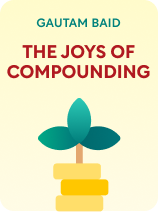

This article is an excerpt from the Shortform book guide to "The Joys Of Compounding" by Gautam Baid. Shortform has the world's best summaries and analyses of books you should be reading.
Like this article? Sign up for a free trial here.
Have you been neglecting to take care of yourself lately? How can you improve your overall health?
According to The Joys of Compounding by Gautam Baid, nurturing your mental and physical health is akin to tending a garden. As you consistently care for and feed each plant, the garden flourishes.
Let’s look at how to improve your overall health, just as you would a garden.
Nurture Your Mental and Physical Health
Consistently applying the following five practices will allow you to fully engage in and appreciate every moment of life, helping you learn how to improve your overall health:
Establish healthy habits: Adopt routines that support your physical and mental well-being, such as consuming nutritious foods, exercising regularly, staying hydrated, getting enough sleep, and effectively managing stress.
(Shortform note: According to James Clear (Atomic Habits), the key to establishing healthy habits is identifying beliefs that prevent you from adopting them and embracing beliefs that support them. This is because your habits reflect and reinforce your self-beliefs. For example, if you believe you’re not the exercising type, you’ll likely avoid workouts, reinforcing that belief. However, if you adjust your belief, choosing to see yourself as someone who can enjoy exercise, you’re more likely to work out, and each workout will reinforce this belief and encourage the habit.)
Think long term: Make daily choices with a focus on their long-term impact on your health and quality of life. Avoid sabotaging behaviors that may harm your future well-being to ensure that you can enjoy life for many years to come. For example, regularly drinking water with your meals will positively impact your long-term health, while drinking sugary soda may lead to chronic health issues.
(Shortform note: Clear (Atomic Habits) argues that unconscious habits account for over half of your daily behaviors—so, to make healthier long-term choices, you must first uncover the unconscious habits driving your decisions. He suggests you can develop awareness around your unconscious behaviors by tracking your daily actions and determining which of your habits are beneficial and which are harmful to your overall well-being.)
Engage in mentally stimulating activities: Participate in activities that challenge your mind, such as solving puzzles or learning new skills. These activities reduce stress by diverting your focus from daily worries and keeping your mind sharp and adaptable.
(Shortform note: Mihaly Csikszentmihalyi (Flow) clarifies how engaging in mentally stimulating activities reduces stress and keeps your mind sharp. The more you focus attention on a task, the more absorbed you feel in what you’re doing. This sense of absorption connects you to the present moment, acting as a protective shield against wandering thoughts about the past or future where worry and anxiety often reside. Simultaneously, it enhances your cognitive abilities by improving concentration, problem-solving skills, and creativity.)
Be conscious of the information you consume. Avoid sensational and negative news to maintain a clear and positive mindset. Consuming positive and informative content can help you stay emotionally balanced and focused on what truly matters. (Shortform note: Mental health experts echo this advice, highlighting that constant exposure to the news can heighten stress, anxiety, and depression. Their recommendations for staying informed without getting stressed include limiting daily news intake to under 30 minutes, selecting reliable news sources known for balanced and objective reporting, and tailoring your social media feed to follow accounts sharing positive and informative content.)
Practice gratitude: Cultivate an appreciative attitude by acknowledging the positive aspects of your life. This mindset shifts your focus from what’s lacking to what makes you happy, fostering resilience in challenging times. (Shortform note: Though the benefits of gratitude are well-known, it can be difficult to remind yourself to focus on what’s going well. Psychologists suggest overcoming this difficulty by establishing a daily gratitude practice, such as keeping a gratitude journal, to create a habit of thinking grateful thoughts. Some self-help practitioners also suggest using visual reminders to trigger thankful thoughts. For example, place a picture of something you really appreciate where you’ll see it most often.)

———End of Preview———
Like what you just read? Read the rest of the world's best book summary and analysis of Gautam Baid's "The Joys Of Compounding" at Shortform.
Here's what you'll find in our full The Joys Of Compounding summary:
- Why compounding isn't just a financial concept, but a transformative principle
- Strategies for compounding your well-being and happiness
- How to achieve steady and sustainable financial growth






